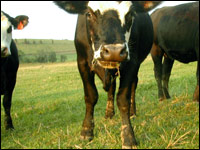local food
-
Sustainable-ag legend Joel Salatin can farm — but can he write?
Over the past 20 years, Joel Salatin has emerged as a sort of guru of the sustainable-food movement. His 500-acre Polyface Farm in Swoope, Va., is legendary among a small circle of foodies for its robustly flavored beef, pork, chicken, and eggs. Among farmers, Salatin has won cult status for his innovations in multi-species, pasture-based […]
-
Umbra on freezing local foods
Dear Umbra, I am lucky enough to live across the street from a farmers’ market, and I shop there all summer. But when summer’s done, the market closes and I am left to buy produce from California. Would it be better for me to buy a small freezer and freeze farmers’ market veggies for winter, […]
-
Umbra on soy vs. meat
Dear Umbra, I finally went vegetarian several months ago, and one of my main reasons was the environmental impact of meat production. The other day, however, a friend pointed out that soy foods take a great deal of energy to produce too. So is there really that big of an environmental difference between TVP [textured […]
-
And why we pay too little for well travelled food
Speaking of eating locally, I've neglected to keep you apprised of the latest developments of our heroes to the North, Alisa Smith and J.B. MacKinnon, who are living on a hundred-mile diet.
In part four, Alisa and J.B. write about the hidden costs of food, China's agro ambitions, and Vancouver's bright spots.
In part five, our dynamic duo heads oustide of their comfort zone to northern British Columbia, where they discover that following the hundred-mile diet isn't as hard as they thought it would be.
-
Universities considering adding organic-farming to curriculum.
Recently in Daily Grist we reported how locally grown foods are catching on at college dining halls.
Now wouldn't it be nice if the students knew the in's and out's of how that food was produced? Well, they may get their chance, as several universities are offering (or are considering offering) organic-farming majors.
But as KATU 2 in Portland, Ore., reports:
... starting up such a major can carry an implicit critique of traditional programs, said Matt Liebman, director of the graduate program in sustainable agriculture at Iowa State University in Ames.
"It implies that everyone else is non-sustainable, and they find that fairly threatening," Liebman said. "It can imply a critique of traditional agriculture, and its effects on the environment, or farm size."Kinda like saying that slapping on non-GMO labels implies that there is something wrong with genetically modified foods.
Now, the question is, will organic-farming majors think that they are morally superior?
-
Sustainable, yes. Possible, not so sure.
So you want to make sure your eating habits are not contributing to global warming, but aren't ready to go veg. You like the idea of eating only organic food, but worry about the long trek much of it makes to get from producer to grocer. So you're thinking about consuming only locally produced fare. But is it possible? Well, Alisa Smith and J.B. MacKinnon are giving it a go and sharing their experience with our friends to the north, The Tyee.
In part one, we get the background:
For the average American meal (and we assume the average Canadian meal is similar), World Watch reports that the ingredients typically travel between 2,500 and 4,000 kilometres, a 25 percent increase from 1980 alone. This average meal uses up to 17 times more petroleum products, and increases carbon dioxide emissions by the same amount, compared to an entirely local meal.
Let's translate that into the ecological footprint model devised by Dr. William Rees of UBC which measures how many planets'-worth of resources would be needed if everyone did the same. If you had an average North American lifestyle in every other way, from driving habits to the size of your house, by switching to a local diet you would save almost an entire planet's worth of resources (though you'd still be gobbling up seven earths). -
Umbra on the perennial packaging dilemma
Dear Umbra, I was recently elected the social chairperson of my subdivision’s swim/tennis/social club. Now I’m in charge of party planning for a group of about 150 families. While shopping at Costco, I wondered which is better for the environment: several 128-ounce jugs of apple juice plus many plastic cups, or lots of 6.75-ounce juice […]
-
Local food
Here's a great AP story about colleges buying more food from local farmers. Students love it because it tastes better. School officials love it because it adds to the "quality of life" that attracts applicants. Cafeteria workers love it because they get to cook and prepare food again instead of just ripping open packages. Farmers with small- and medium-sized farms love it because it helps them stay above water. And environmentalists love it because it encourages the organic food industry and results in fewer miles of polluting transportation of food.
Consider what's holding this back from spreading and becoming common practice, not only for schools and other institutions but for the average consumer. It is not desire, I suspect -- even the totally eco-unconscious prefer better-tasting food. What's lacking is technology: The ability to closely track exactly what farmer has what and when, what consumer wants it and when, where they both are, and the most efficient way for them to connect. This kind of technology is being developed in bits and pieces all around us.
Enviros can help by publicizing and celebrating trends like this.
-
Umbra on when to retire a fridge
Dear Umbra, I love to freeze fresh veggies at their peak of ripeness during the summer. Then, in the winter, I don’t have to buy commercially frozen veggies or long-distance transported ones. In order to do more of this, I’d like to move my 1985 refrigerator to the basement and use its freezer entirely for […]
